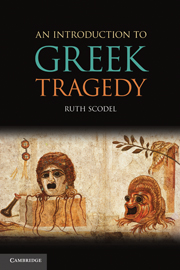3 - Origins, Festival, and Competition
Published online by Cambridge University Press: 05 June 2012
Summary
ORIGINS
Almost everything about the origins of tragedy is disputed, because the evidence is scanty, and scholars disagree profoundly about how reliable most of it is. Unfortunately, the very real questions about how tragedy began have become entangled with two issues of great importance for its interpretation: how religious tragedy was and how democratic it was. Scholars tend to assume that if tragedy began as a ritual dance, it must be interpreted as a religious event; if it began under the democracy, it is likely to be engaged with specifically democratic values. Neither of these assumptions is necessarily true. Tragedy could have continued to serve the same religious, social, and political functions through time, or it could have changed as circumstances changed. However, because scholars assume that we would know something crucial about tragedy if we knew its origin, they become too invested in different possible accounts. Furthermore, we tend to forget that three innovations must have taken place for tragedy as we know it to exist. First, somebody created a new kind of performance by combining a speaker with a chorus and putting both speaker and chorus in disguise as characters in a story from legend or history. Second, this performance was made part of the City Dionysia at Athens. Third, regulations defined how it was to be managed and paid for. It is theoretically possible that all these were simultaneous, but it is not likely.
We can start with what we hear about Thespis.
- Type
- Chapter
- Information
- An Introduction to Greek Tragedy , pp. 33 - 55Publisher: Cambridge University PressPrint publication year: 2010



